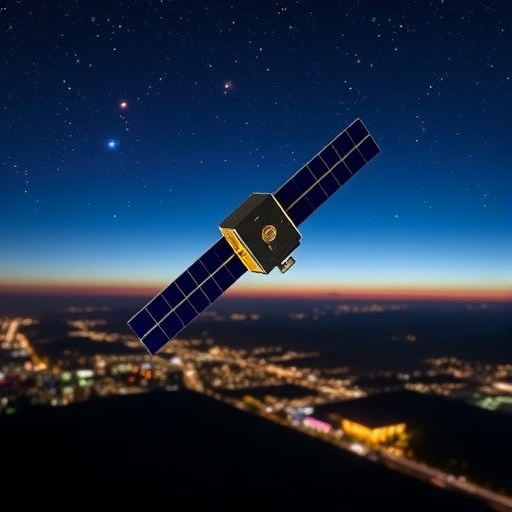For over two years, the Austrian mini-satellite PRETTY has been successfully orbiting the Earth at an altitude of over 500 kilometers, providing invaluable scientific data from its sun-synchronous polar orbit. Launched in 2023 with an ambitious mission to contribute to climate research and satellite technology, PRETTY has exceeded its original one-year operational plan. As its commissioning phase concluded at the end of 2023, the satellite was able to provide continuous monitoring of critical environmental parameters such as changes in polar ice and sea levels, shedding light on the ongoing climate crisis. The satellite has also been instrumental in studying the effects of space weather on the lifespan of satellites, further enhancing our understanding of both space and terrestrial systems.
In a pivotal move for the project, the Austrian Space Agency (ALR) of the Austrian Research Promotion Agency (FFG) and the European Space Agency (ESA) have announced a significant extension for the PRETTY mission. This extension, set to last until December 2026, will see the satellite rebranded as OPS-SAT PRETTY and will transform its operational objectives. The announcement came as a result of the successful data collection and overall achievements of the PRETTY project, which was developed collaboratively by key institutions including Graz University of Technology, Beyond Gravity Austria, and Seibersdorf Laboratories. Managing Director of the FFG, Karin Tausz, expressed gratitude for the project’s success and confirmed the allocation of an additional budget of 365,000 euros to sustain its operations.
With the upcoming changes, OPS-SAT PRETTY is set to serve a new role as a flying laboratory within the OPS-SAT Space Lab. This initiative builds on the legacy of the original OPS-SAT satellite, which had also been developed at TU Graz and demonstrated the utility of experimental platforms in a space setting. The original OPS-SAT mission concluded in May 2024 as it safely re-entered the Earth’s atmosphere after a fruitful four-and-a-half-year mission. OPS-SAT PRETTY’s transition to a platform for experimental research offers unprecedented opportunities for both organizations and individuals to conduct hardware and software experiments that are crucial for technological advancement in space.
The satellite is equipped with various subsystems that offer a versatile and easily configurable platform for experiments in space research. The extension of the mission signifies a growing interest in innovative research approaches, and the flexibility of the OPS-SAT PRETTY satellite allows diverse entities to explore ambitious ideas in a practical environment. Project Manager Manuela Wenger, hailing from the Institute of Communication Networks and Satellite Communications at TU Graz, highlighted the significance of the satellite’s reliability and ongoing commitment to providing valuable data and services to the scientific community.
Throughout its initial operational phase, PRETTY mastered its scientific objectives with remarkable efficiency. It facilitated the testing of innovative space technologies that allow climate scientists to gather essential data critical for understanding global changes. The satellite’s compact design, comparable in size to a shoebox, has made it possible to acquire vital climate information without reliance on larger, more expensive satellites. One of the cornerstone technologies aboard PRETTY is a passive reflectometer developed by Beyond Gravity, which senses signals reflected from ice, water, and land masses, utilizing data from both European and American navigation systems.
The scientific community has lauded the achievements of PRETTY. By harnessing the reflectometer technology, researchers can glean crucial insights into environmental conditions that affect global climate patterns. Additionally, the direct transmission of this data from the ground station at Graz to the scientific community has streamlined the processes of research dissemination and collaboration, enhancing the pace at which important findings can be utilized for developing climate models and policy decisions.
OPS-SAT PRETTY also hosts another innovative instrument known as the SATDOS dosimeter, developed by Seibersdorf Laboratories. This device measures the exposure to space radiation, providing critical data on how such exposure affects the electronic components of satellites. The opportunity to analyze radiation levels directly from PRETTY’s orbit is unprecedented and has critical implications for future satellite design and operational strategies. According to Christoph Tscherne, a project manager at Seibersdorf Laboratories, the information gleaned from SATDOS has revealed the vulnerabilities of commercially available standard components commonly employed in space missions, an insightful finding that can influence future satellite engineering practices.
As PRETTY embarks on its new mission as OPS-SAT PRETTY, the collaboration among the partner organizations—TU Graz, Beyond Gravity Austria, and Seibersdorf Laboratories—will continue to thrive. Each institution plays a vital role in ensuring that the satellite meets its experimental objectives while maintaining operational excellence. The leadership and vision shared by Project Manager Manuela Wenger, along with her team, reflect a collective commitment to pushing the boundaries of space exploration and understanding.
The continued success of OPS-SAT PRETTY not only reinforces the prowess of Austrian space technology but also serves as an emblem of international collaboration in the realm of scientific research. The mission stands as a testament to the importance of innovative solutions in addressing global challenges. As climate concerns escalate, spaceborne observations from missions like OPS-SAT PRETTY will become increasingly indispensable for fostering informed environmental policies and fostering a sustainable future.
In summary, the transition from PRETTY to OPS-SAT PRETTY represents a significant milestone in satellite research and development. With its new objectives, the satellite is poised to foster a new era of experimentation in space, contributing critical data and insights that could reshape our understanding of climate phenomena and satellite resilience. The positive outlook for the extended mission reflects not only past achievements but also an unwavering commitment to advancing scientific frontiers in the years to come.
Subject of Research: Space Technology and Climate Monitoring
Article Title: Extended Mission for Austrian Mini-Satellite OPS-SAT PRETTY Enhances Climate Research Capabilities
News Publication Date: October 2023
Web References:
References:
Image Credits: Lunghammer – TU Graz
Keywords
OPS-SAT, satellite technology, climate research, space weather, environmental data, Europe, Austria, space missions, scientific collaboration, mini-satellite, research extension.




